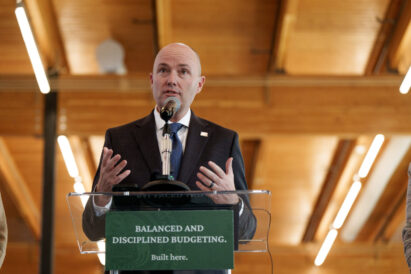As Utah’s fluoride ban begins, health officials urge Utahns to protect their teeth
Although 1.6 million people will be impacted by the ban, most of rural Utah has already stopped adding fluoride to drinking water

Melissa Majchrzak, Associated Press
Health Secretary Robert F. Kennedy Jr. visits the University of Utah to discuss Utah's new fluoride ban and food additives legislation Monday, April 7, 2025, in Salt Lake City.Utah is set to become the first state in the nation to ban fluoride in drinking water, with a new law taking effect later this week, on Wednesday.
That day, the fluoride taps will turn off, if they haven’t already. While Davis and Salt Lake counties, and Brigham City, are the only governments that still add fluoride to drinking water, roughly half of the state’s population lives there.
Sponsored by Rep. Stephanie Gricius, R-Eagle Mountain, HB81 prevents counties and municipalities from adding fluoride to drinking water, while adding it to the list of drugs pharmacists can prescribe.
The reasoning, Gricius said, is that the decision should be left to the individual.
“I would just say it doesn’t get more local control than my own body,” she said during the legislative session earlier this year.
Gricius’ bill was one of several that aligned with the “Make America Healthy Again,” or MAHA, agenda promoted by U.S. Health and Human Services Secretary Robert F. Kennedy Jr., who praised the law earlier this year.
Now, for health officials like Stacey Bank, executive medical director for the Utah Department of Health and Human Services, the focus is on educating the public and reminding them that fluoride is now readily available at most pharmacies.
“I’m grateful for the opportunity to have this conversation. We haven’t talked about oral health and fluoride this much in my career as long as I can remember. This is an opportunity to get the message out to the entire state,” she said on Friday. “I know it’s not always easy to get into a doctor or dentist, there are barriers there. Going to your local pharmacist, talking to the person behind the counter, is enough to take care of your teeth.”
There are currently 25 water systems serving about 1.6 million people spread out across Davis and Salt Lake counties, and Brigham City, that add fluoride to the water. Brigham City has been adding fluoride to the water since the 1960s; Davis County started in 1999; and Salt Lake County in 2003.
Some treatment plants have already stopped adding fluoride to the water, including a handful in Davis County, and Salt Lake County’s City Creek Water Treatment Plant.
If Utahns don’t act, expect tooth decay, officials say
“If I was looking into a crystal ball, we’re going to see a decline in oral health if our community doesn’t take action, and now go to their dentist and talk about what’s best for them and receive their supplements. If that happens, I don’t think we’ll see much of a change,” said Brian Hatch, director of the Davis County Health Department.
In Salt Lake County, where the water has been fluoridated for almost two decades, health officials say they’re losing an effective public health tool.
“From a public health standpoint, we know that community water fluoridation is the best way to benefit individuals and the overall community’s oral health,” added Ron Lund, environmental health director for the Salt Lake County Health Department. “It’s the most efficient and effective way to do that for people who cannot afford or may not be able to go to routine dental visits.”
But while health officials say it’s possible they’ll see an uptick in cavities in regions currently fluoridating their water, others see the bill as an opportunity. Most of rural Utah has already stopped adding the mineral to the public water supply.
Fluoride is a hot topic now, and with the May 7 deadline approaching, it gives public health experts a chance to educate communities, they say.
“It’s an opportunity for our more rural communities. Other than Brigham City, none of our rural communities have been adding fluoride to the water. So this is bringing more attention to how important fluoride is and giving them access to get it, that they may not have known they needed,” said State Dental Director Stacey Swilling.
But concern remains. Shifting the responsibility to individuals means Utahns will have to be more proactive about getting fluoride, which could be a burden, especially to low-income families that may already struggle with access to transportation or public health information.
Swilling, who used to practice dentistry in another state, said it was clear which patients have access to fluoridated water.
“Anectdoally, where I used to practice, I can tell you I saw a huge difference … There’s plenty of research out there that does show the disparities,” she said, pointing to studies conducted in Juneau, Alaska, and Calgary, Alberta, where the removal of fluoride from drinking water resulted in a spike in cavities.
Most officials agree — Utah is headed into uncharted waters. While there are case studies in other cities, counties, states and countries, Utah is the first U.S. state to pass a sweeping ban, while also trying to make fluoride more accessible over the counter.
“We don’t know how this is going to turn out,” Bank said. “We know about barriers to care, that’s our job, to look for and eliminate those. At this point, we’re trying to educate the public. It is going to take a more proactive effort, and we are going to have to look at those barriers and let this unfold to see how those barriers are affecting people.”
Fluoride is a mineral that has been shown to strengthen teeth by replacing minerals that are lost from acid breakdown, according to the U.S. Centers for Disease Control and Prevention. Since the 1940s, communities around the country have been fluoridating their water.
A recent report from the National Toxicology Program found that high levels of fluoride in drinking water can be associated with a lower I.Q. in children, but according to the report, those levels are twice as high as the current recommended amount of fluoride.
“The thing we need to know about those studies is that they were done looking at fluoride levels that were far outside what we are recommending for oral health,” Bank said. “We know what we’re trying to do today is a safe and effective dose of fluoride.”
Still, that drop in I.Q. is often cited as a reason to stop adding fluoride to water, part of a nationwide movement against the mineral. Perhaps the most prominent critic of fluoride is Kennedy Jr., who applauded Gricius’ bill during a stop in Utah in April.
“It makes no sense to have fluoride in our water. The evidence against fluoride is overwhelming … we know that it causes I.Q. loss,” Kennedy, a longtime critic of certain public health policies and medical practices, said during his visit “I’m very, very proud of this state for being the first state to ban (fluoride). I hope many more will come.”
Gricius’ bill passed mostly along party lines, with a handful of Republicans joining Democrats in opposition. Despite the pushback from dentists and other health professionals, it was signed by Utah Gov. Spencer Cox on March 27.
Utah News Dispatch is part of States Newsroom, the nation’s largest state-focused nonprofit news organization.



